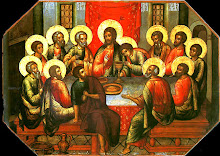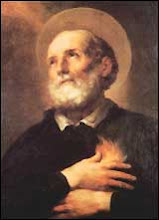 If one finds a near-inexplicable despair in the anthropological insights of René Girard's mimetic theory, it is quite understandable. All right, perhaps not so much despair, but a heavy, Saturnine despondency. Girard's explication of the undeniable realities of human fallenness - realities to all except those so far under the waters of denial, hubris, or naïveté can't possible reach the air of truth - flesh out the Church's doctrine of Original Sin with tonic clarity. In what seems a "unified field theory," one can reach the end of mimetic theory feeling as though one has in the darkness traversed the totality of the air-tight, light-proof gestalt of human existence, and now one has no recourse but to sit down and wait the coming end in a morbid awareness of all of humanity's broken, dismal, satanic realm.
If one finds a near-inexplicable despair in the anthropological insights of René Girard's mimetic theory, it is quite understandable. All right, perhaps not so much despair, but a heavy, Saturnine despondency. Girard's explication of the undeniable realities of human fallenness - realities to all except those so far under the waters of denial, hubris, or naïveté can't possible reach the air of truth - flesh out the Church's doctrine of Original Sin with tonic clarity. In what seems a "unified field theory," one can reach the end of mimetic theory feeling as though one has in the darkness traversed the totality of the air-tight, light-proof gestalt of human existence, and now one has no recourse but to sit down and wait the coming end in a morbid awareness of all of humanity's broken, dismal, satanic realm.Of course, Girard himself, if one takes a look at his own life, would deny this. Clearly, he has put his "eggs" in a different "basket" than either a Qohelethian nihilism or an existence of using mimetic theory to some sort of "will to power" (some do both, as you know).
So it has been my good fortune - or Providence, rather - to come upon an Elfstone in my path. It is a book written by an Anglican priest and published by Oxford entitled, Planet Narnia: The Seven Heavens in the Imagination of C. S. Lewis.
It is as though the facts of our baneful existence as a race of beings has had an antidote, a bright-shining counterpart (as Girard insists) that existed with strength and vigor, has been under our noses all along, stifled by the spirit of our age. But this counterpart is not quite so dead as unacknowledged, not so gone but merely forgotten, not crushed and gone forever but merely awaiting a too-long winter's exit and fulfillment of heart's desires.
Michael Ward has thematized something that not only Western culture needs desperately, but also individuals' hearts and souls and spirits. It is not the antidote to Girard's realism but a necessary companion, and just as helpful to Catholic magisterial truth, goodness, and beauty.








No comments:
Post a Comment